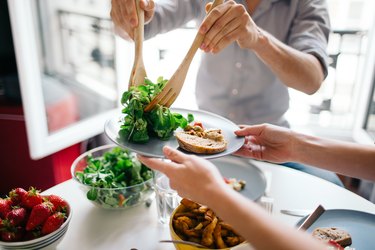
Eating is meant to satisfy your appetite and your taste buds, but when you don't feel full after a meal, this can lead you to either eat more or feel unsatisfied with your meal. If you're trying to keep your weight under control, a failure to feel full can be cause for concern. Feeling satisfied after a meal is a complicated process that involves hormones and your brain. Understanding how feelings of fullness are triggered can help you determine why you don't feel full after a meal.
Do you want to lose weight or be healthier? Join MyPlate Calorie Counter and get access to free meal plans, healthy recipes and at-home workouts. You'll also get daily calorie and macro goals for your fitness journey. Don't miss your chance for amazing results. Sign up today!
Video of the Day
Video of the Day
Tip
Not feeling full after a meal may have a number of causes, from hormone levels to your food choices.
Hormones and the Brain
Your stomach has receptors that send messages to your brain to tell it when you are full. Just as it takes a few rings to reach someone on the telephone, the messages between your stomach and brain aren't instantaneous. It takes your stomach about 15 minutes to signal your pancreas to release the hormone cholecystokinin, which signals your brain that you are full. If you are eating too quickly, your hormones may not be signaling that you are full.
Mindful Eating
Feeling full after eating a meal can be equal parts physical, such as your stomach stretching because it's full, and mental. The mental part comes from the satisfaction associated with eating a meal. Your taste buds and your sense of smell can play a role in helping you feel full after a meal.
If you have eaten very quickly, there's a chance you may not feel as full as if you had slowly savored each bite. This is called mindful eating, which is when you're focusing on the present moment, paying close attention to your feelings, thoughts and sensations as you eat, according to Dr. Lillian Cheung, a nutritionist and lecturer at Harvard T.H. Chan School of Public Health.
Energy Density
Volume and number of calories can affect your feeling of fullness. Eat foods that are low-energy dense, which means they are low in calories, as well as high in bulk. This means that you can eat a larger volume of food without consuming too many calories. When you eat low-calorie foods, you are able to eat more of them, which can stretch your stomach and activate the hormone receptors that trigger feelings of fullness.
Think of it this way: Eating two chocolate chip cookies is equivalent to eating a full bowl of green salad with tomatoes, cucumbers and low-calorie dressing. The cookies and the salad may have comparable calorie counts, but the salad is more likely to leave you feeling full. If you do not feel full after eating, consider switching to foods that have a low-calorie density.
Leptin Resistance
For some, eating slowly and mindfully isn't enough to create a feeling of fullness after a meal. This is because their bodies do not properly use the hormone leptin, which is associated with feelings of fullness and pleasure after eating, according to Harvard Health Publications. Normally, leptin interacts with your brain after a meal, and your brain sends a signal to stop eating. If you experience leptin resistance, your body may not accurately interpret the signals for feelings of fullness. As a result, you may not feel full after you have finished eating. Speak with your doctor if you are unsure whether your body is using leptin or digestion-related hormones properly.